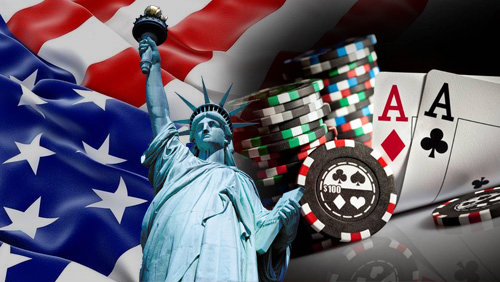While Sheldon Adelson’s subsidized lawmakers in D.C. are busy trying to destroy internet gambling, one of the nation’s most populous states is moving in the other direction with a plan to legalize and regulate online poker. State Sen. John Bonacic (R-42nd District) introduced a bill this past Friday that would amend the state’s racing and gaming law specifically to allow online poker in New York.
 If the law were passed it would authorize 10 licenses at $10 million apiece, with each one good for 10 years. Both cash games and tournaments would be permitted, with the bill specifically providing for “Omaha Hold’em and Texas Hold’em poker, as well as any other poker game that the Commission determines is the material equivalent of either of those.” Online poker operators in New York would pay a 15 percent tax on their gross gaming revenue, defined as “the total of all sums paid to a licensee from interactive gaming involving authorized participants, less only the total of all sums paid out as winnings to patrons and promotional gaming credits.” Interstate compacts such as the one signed by Delaware and New Jersey earlier this year (and set to go live in June) are specifically permitted.
If the law were passed it would authorize 10 licenses at $10 million apiece, with each one good for 10 years. Both cash games and tournaments would be permitted, with the bill specifically providing for “Omaha Hold’em and Texas Hold’em poker, as well as any other poker game that the Commission determines is the material equivalent of either of those.” Online poker operators in New York would pay a 15 percent tax on their gross gaming revenue, defined as “the total of all sums paid to a licensee from interactive gaming involving authorized participants, less only the total of all sums paid out as winnings to patrons and promotional gaming credits.” Interstate compacts such as the one signed by Delaware and New Jersey earlier this year (and set to go live in June) are specifically permitted.
The “Legislative Findings And Purpose” section that opens the bill dives directly into the question of whether poker is a game of skill. Noting that both New York and federal courts have held that contests of chance can be games of skill when players are pitted against one another rather than the house, the bill specifically declares that Texas Hold’em and Omaha Hold’em, as games of skill, “do not fall under the definition of gambling” under New York state law. The same section also features a robust “bad actor” clause that prohibits the use of any asset used to accept wagers online in the state after the 2006 passage of UIGEA, including intellectual property and customer lists.
The bill was read twice and referred to the Senate Committee on Racing, Gaming, and Wagering, of which Sen. Bonacic is the chair. This guarantees that the bill will be debated before the full Senate. If it passes there and in the Assembly it will go to the desk of Gov. Andrew Cuomo. The Democrat was the biggest proponent of a referendum calling for four new casinos in upstate New York to go along with the five Indian-run casinos and nine racetrack slot-machine parlors. The referendum was approved by 57 percent of the state’s voters last November.
A few items of note:
Though he is a Democrat and the bill’s sponsor is a Republican, it seems unlikely that Gov. Cuomo, such a strong and recent backer of the state’s gaming industry as a source of economic development, would raise major objections to a bill being sponsored by the Senate’s gambling committee chairman. Should the bill make it to his desk, its passage would be a pretty safe bet, even if it came in an amended form.
If the bill were to pass, regulations would be on the books within 180 days and the first licenses would be issued within the next 180 days. We could potentially see the first hands of online poker dealt in New York within a year of Gov. Cuomo’s signature.
The ability for the state to share liquidity is a big deal. Any compact that included New York would be an effective market counterweight to California whenever the Golden State, which is big enough to go it alone, gets its act together and passes an online poker bill.
The tax rate for online poker in New York would be higher than the 10 percent tax that land-based New York casinos pay on table games but below the 37-to-45-percent range for slot machines. The tax on online poker is identical, though, to that levied on casinos operating online in neighboring New Jersey.
John Bonacic’s attempts to bring online poker to the Empire State fly in the face of the idea that Sheldon Adelson’s blatant manipulation of federal politicians means the Republican Party itself presents a united front against online gambling. As with many other issues regarding modern technology, there are divisions within both parties and neither can be fully counted on as either an enemy or a proponent.
Online and brick-and-mortar concerns have traditionally been at each others’ throats, but the potential launch of online poker in New York comes not long after the expansion of land-based gaming within the state. This could be just a by-product of political maneuvering within New York ahead of the election last year, but it could also bode well for future expansion of online gambling in other states where brick-and-mortar concerns are less entrenched.